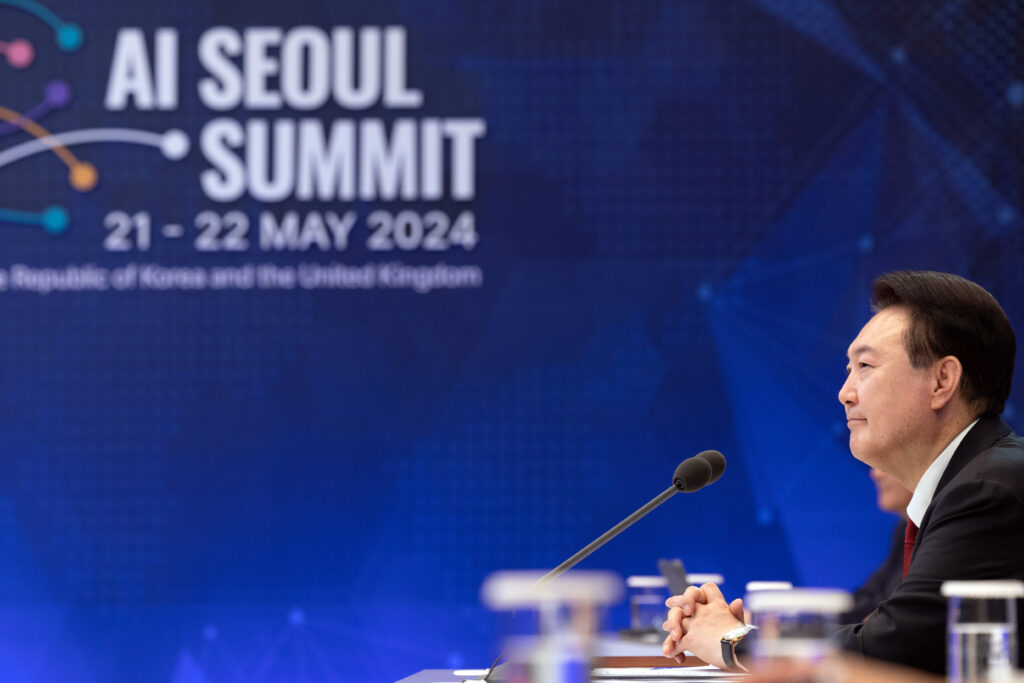The Peninsula
Major Commitments Launched at the AI Seoul Summit

Korea once again found itself as an important facilitator for discussions on international artificial intelligence (AI), co-hosting the recently concluded AI Seoul Summit. The summit served as a follow-up to last year’s inaugural AI Safety Summit, which took place in the United Kingdom, and it produced a number of new commitments regarding the safe and responsible use of AI. The first commitment from the AI Seoul Summit is the Seoul Declaration for Safe, Innovative, and Inclusive AI, which was agreed to by world leaders spanning ten countries and the European Union. Expanding on the declaration made at last year’s summit, this year’s promulgation supported a number of different priorities regarding a common agenda on AI. Among them are supporting the operationalization of the G7 Hiroshima Process on AI, cooperating on AI safety, and moving toward a general international governance framework. Moreover, the declaration highlighted initiatives such as the Hiroshima AI Process Friends Group, OECD AI principles, and the recent United Nations General Assembly resolution on AI.
The Seoul Declaration’s addendum was the Seoul Statement of Intent toward International Cooperation on AI Safety Science, another declaration specifically geared toward a common approach to the science of AI safety. The aims are to create an international network of AI Safety Institutes and work toward a common International AI Safety Report—steps that are particularly pertinent to growing global concerns regarding AI’s potential risks. Actions to work toward this were coordinated by global representatives. Timed with the first day of the summit, US Secretary of Commerce Gina Raimondo released a strategic vision for the recently created US AI Safety Institute to work alongside other AI Safety Institutes and stated plans for convening a meeting of the larger network of international AI Safety Institutes in San Francisco later in 2024, developments carried further with a pledge by Korea to form an AI Safety Institute of its own. Meanwhile, the Seoul Ministerial Statement, affirmed by 27 countries and the European Union, furthered commitments made in the Seoul Declaration to address AI’s use in risk areas like chemical weapons development.
Statements by world leaders were equally prominent during the summit. In the lead up to the two-day event, Korean President Yoon Suk Yeol and British Prime Minister Rishi Sunak published a collaborative opinion piece promoting a shared vision of future AI development based on “innovation, safety, and inclusivity.” These themes were reinforced in President Yoon’s speech during the leader’s session, where he touched on the importance of AI in the democratic system and stated the need to “secure AI safety by minimizing any negative effects AI might have and prevent damage to democracy.” Along these lines, United Nations Secretary-General Antonio Guterres, who has been particularly vocal about the UN’s lead in a global AI framework through the Global Digital Compact, called for “universal guardrails” on AI and iterated the United Nations’ advocacy for common AI standards. He also supported the creation of a UN AI Office through its AI Advisory Body to help coordinate such efforts.
Last, the summit involved companies at the forefront of AI research. A landmark resolution was made with more than a dozen major AI-related technology powerhouses including Google, OpenAI, Mistral, Samsung, and Naver on the responsible deployment of frontier AI models. Spelled out as the Frontier AI Safety Commitments, it helps to ensure a common standard of transparency and risk monitoring as some of the latest AI systems continue to come online.
The above-mentioned commitments are only the start of a unified consensus among governments and companies on how to responsibly handle the breakthrough technology. The United Nations’ Global Digital Compact, which the Seoul Declaration welcomed as a topic of discussion for the UN Summit of the Future in September, as well as the Responsible AI in the Military Domain (REAIM) Summit in Seoul from September 9 to 10 are likely to form the next steps, expanding with a follow-up Seoul AI Summit at the AI Action Summit in France in February 2025. With these developments on the horizon, the makings of a common intergovernmental AI framework may be beginning to take shape.
Tom Ramage is an Economic Policy Analyst at the Korea Economic Institute of America. The views expressed here are the author’s alone.
Photo by Yang Seung Hak on the Republic of Korea’s official Flickr account.
KEI is registered under the FARA as an agent of the Korea Institute for International Economic Policy, a public corporation established by the government of the Republic of Korea. Additional information is available at the Department of Justice, Washington, D.C.
